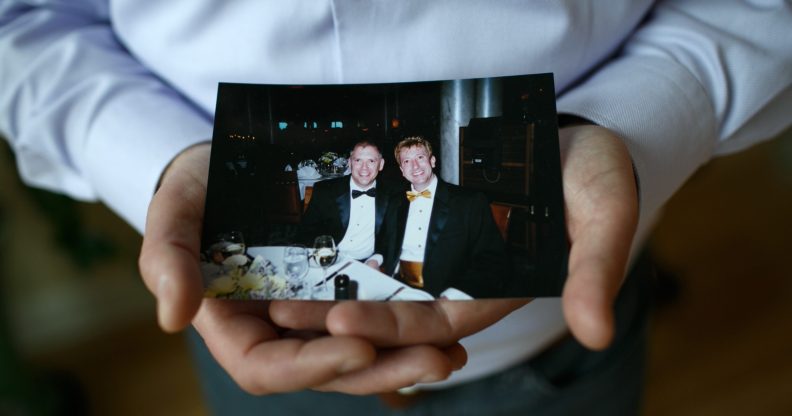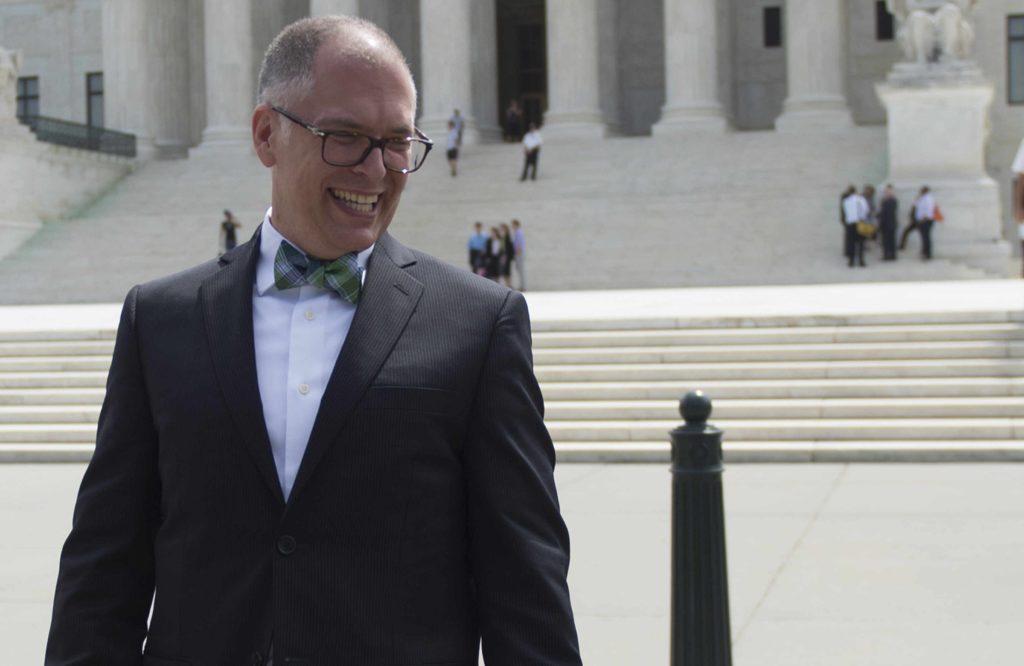Five years after love won, the gay man who bravely fought for marriage equality is mourning his husband

Jim Obergefell holds a photo of him and his late husband John Arthur in his condo in Cincinnati, on April 2, 2015. (Maddie McGarvey/For The Washington Post via Getty Images)
To Jim Obergefell, the lead plaintiff in the US Supreme Court case that enshrined marriage equality across all states, June 26, 2015 isn’t the only date etched into his mind.
After the long-sought victory was scraped in a grueling five-to-four vote five years ago, June 26 became a day that would be ringed in the 54-year-old’s calendar for years to come.
But there was another life-altering date that he has only just begun to reflect on: October 22, 2013, the day his husband died.
Five years since Obergefell v. Hodges, Obergefell described how, with press engagements petering out, his long-lurking grief has started to manifest.
Same-sex marriage plaintiff is ‘still grieving’ his late husband five years on.
“When I found myself not rushing here, there, and everywhere, the grief started to hit, and the loss started to hit,” Obergefell CantonReo.
“I thought I’d worked through a lot of it but when you don’t have those other things to keep you busy, you realise you’re still grieving.”
He said that self-help books often detail grief as a neat process, ordered into tidy steps.
“That implies it’s the same for every person, and it isn’t,” he said. “I’m still grieving, I’m still processing.”

Jim Obergefell. (Maddie McGarvey/For The Washington Post via Getty Images)
In July 2013, Obergefell married his partner, John Arthur. They got married in a plane sat on the tarmac in Maryland as, in their home state of Ohio, it was illegal for two same-sex people to marry.
Arthur was ill. He had motor neurone disease. Obergefell knew the love of his life was withering, and he died just three months later.
Officials were unable to list Obergefell as Arthur’s husband on his death certificate, leading to the seismic court case where Obergefell and dozens of other plaintiffs fought for the right to marry.
They won.
Jim Obergefell: ‘Young people today are willing to fight on behalf of someone else who’s being bullied’.
Around 300,000 same-sex couples have married since justices moved the US away from a patchwork of laws on marriage, sending a uniform signal to the world that, in the US, LGBT+ rights are a priority.
In the years that have followed, Obergefell has watched as Donald Trump began to steadily chip away at LGBT+ rights. With a legislature snarled by two houses with opposing majorities, LGBT+ activists were forced to look to the country’s court system as a way to win equality – whether Trump likes it or not.
With the Supreme Court’s most recent victory – basic workplace protections for LGBT+ employees – still reverberating, Obergefell is optimistic about the future.

(JIM WATSON/AFP/Getty Images)
“When I’ve spoken at universities, students come up afterward,” he said. “They confide in me something they haven’t confided in anyone else. They say: ‘I’m like you, Jim. I like boys.’
“When young people feel safe enough to share that with me, that is by far the most meaningful thing that could happen in my life.
He added: “Young people today are willing to fight on behalf of someone else who’s being bullied, being mistreated.
“The fact that kids are living in a world where they can be much more authentic, I find that stunning.”
These days, Obergefell works with Columbus agencies to support the local LGBT+ community and is throwing his weight to the Black Lives Matter movement.
“I knew things would slow down in my life when the focus moved away from LGBTQ issues. It’s expected, it makes perfect sense,” Obergefell said.
“There were other fights that were rightly in the public’s eye.”

